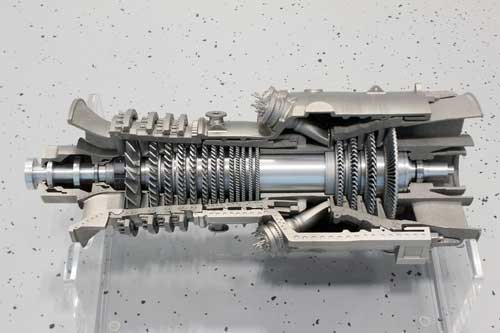| Sep 17, 2019 |
Turbine from the 3D printer
|
|
(Nanowerk News) Together with the H+E-Produktentwicklung GmbH in Moritzburg, Saxony, the Fraunhofer Institute for Manufacturing Technology and Advanced Materials IFAM in Dresden has developed a true-to-scale gas turbine that impressively demonstrates the current potentials and limitations of powder bed-based additive technologies. The technology demonstrator "Siemens SGT6-8000 H", a scaled model of a gas turbine for power generation on a scale of 1:25, was completely manufactured with additive processes except for the shaft.
|
|
The component assembly consists of 68 parts made of aluminium, steel and titanium, which through component optimisation and the possibilities of Electron and Laser Beam Melting technologies replace the almost 3000 individual parts that make up the original component. The turbine is fully functional. At the same time the combination of conventional manufacturing technologies - in this case machining - and additive processes with Laser Beam Melting (LBM) and Selective Electron Beam Melting (SEBM) is shown in one component.
|
 |
| Scaled model of a gas turbine for power generation; completely manufactured with additive manufacturing technologies. (Image: Fraunhofer IFAM Dresden)
|
|
Fraunhofer IFAM was involved in the manufacturing of the component as well as the data modification for the technology-adapted production. The housing components with stator stages were manufactured directly on site at the Innovation Center Additive Manufacturing ICAM® in Dresden. They were produced using Electron Beam Melting (EBM) of Ti-6Al-4V in the Arcam Q20+ plant. The turbine stages and the other housing components were manufactured at H+E using Laser Beam Melting.
|
|
The production planning was particularly important and accordingly complex to determine the right technology for each component. The accuracy and roughness of the surfaces, for example, had to be taken into account. Also the necessity and number of support structures as well as the component size had to be considered. The functionality of the demonstrator was a prerequisite for all considerations. For example, the shaft and turbine stages had to be able to rotate freely between the stator stages and the individual components of the demonstrator had to be connected to each other with minimum effort - by screwing and plugging on.
|
|
The components were modified constructively with the experience of the process experts involved in order to be able to manufacture "first time right" for the additive manufacturing technologies used. This goal was achieved. For example, the 316L housing segment could be manufactured by LBM completely without support structures after the adaptations.
|
|
The combination of different materials commercially available from the respective plant manufacturers is demonstrated in the component. Not all processed materials correspond to the target materials for turbines. The limitation lies in the fact that these materials cannot yet be processed in such a way that they can be offered commercially.
|

